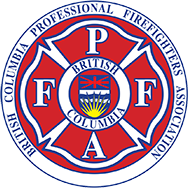About Us
The BC Professional Fire Fighters Association (BCPFFA) and is now comprised of 8 regions overseeing 56 locals who represent over 4,700 professional men and women fire fighters, dispatchers, prevention officers and support members in BC, including the Yukon.
What We Do
The BCPFFA is a service provider for its affiliates offering training and education in areas of provincial legislation, occupational health and safety, WorkSafe advocacy, financial assistance, bargaining, labour law, and advocacy for best practices in both public safety and fire fighter safety.
Work with the provincial government and WorkSafe BC to recognize and improve fire fighters’ health and safety for all of British Columbia’s professional fire fighters.
Assist with contract negotiation, grievance arbitrations and labour management issues.
Access to key information on wages, benefits and working conditions.
Provide online resources to address and assist with challenging issues facing affiliates and members.
Assistance in developing public and member communications.
Educate decision-makers about public safety and the importance of adequate staffing levels.
Provide financial assistance for small locals to attend educational training and conferences.
Provide locals with financial assistance for interest and grievance arbitrations.
Organize and facilitate health & safety, political, labour management and educational events & programs such as,
Annual Legislative Conference in Victoria
Biennial Convention
Biennial Fire Ops 101
Biennial BC Fire Leadership Summit
Biennial Affiliate Leadership Training Conference in Canada – the largest union leadership training conference in BC.
IAFF Fire Ground Survival
Occupational Health & Safety Best Practices
Mental Health Training and Assistance Programs
Peer Support Workshops
Worksafe Advocacy Workshops
Virtual Info-Sessions
In accordance to Constitution and Bylaw Article 2, Objects: The objects of the Provincial Associations shall be to encourage the organizing of all paid fire fighters in British Columbia, to promote and encourage Occupational Health and Safety awareness to all fire fighters within the Province, to encourage a higher plane of skill and efficiency, sick and death benefit funds, a pension system, the cultivation of fellowship among its members, and to seek such legislation as may improve the position of the fire fighter.

